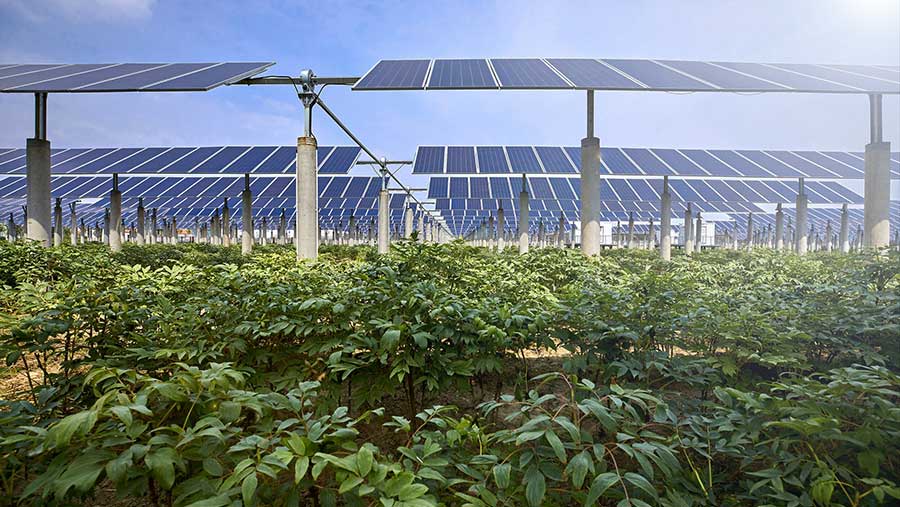Advertiser content
Optimising land management through agrivoltaics
Amid the disastrous effects of climate change, global policy is constantly evolving to reduce fossil fuel combustion and support alternative forms of energy generation that reduce greenhouse gas emissions.
Whilst replacing all sites of non-renewable energy generation with renewable sources may elicit support in theory, this energy transition is much more complex.
One of the most prominent barriers to developing renewable energy systems is the vast amounts of space that are required for their development, and the common pushback from local communities and landowners contending that such space would be better suited for other purposes: namely agriculture.
With costs of food soaring alongside rising energy prices as part of the UK’s imminent cost of living crisis and global population increases, viable land to produce these resources is becoming scarce.
Regener8 Power has come up with a development approach that provides a solution: combining the processes in a multi-use land system, known as agrivoltaics.
Agrivoltaic Systems
Agrivoltaics is based on the scientific integration of high-value farming activities into the solar array in accordance with specialised modular structures and their corresponding microclimatic conditions.
Solar assets can also transform farming operations through on-site electrification and help to improve the long-term health of the land parcel.
Instead of focusing solely on the electrical output of our systems, Regener8 aims to responsibly develop projects as an element of the landscape in which they belong.
Over the lifespan of a project, we seek to optimise land-use by taking a holistic view of the local constraints and opportunities at a given site, focusing on the long-term restoration of degraded soils, supporting carbon management and improving ecological connectivity with the wider landscape through regenerative farming practices.
In the long-term, by improving ecosystem services and their subsequent production, land can produce the highest quality of crops and support sustainable food systems.
Agrivoltaic systems therefore optimize the overall use of the land through a highly synergetic relationship between specialised solar structures and agricultural activities, with research estimating increased land use efficiency of up to 150%.
Practical Benefits of Agrivoltaic Systems
Solar panels offer additionality to crop cultivation by:
Providing protection
- the physical structures shield against extreme weather events which are increasing in the face of climate change, such as heavy rainfall, hail, and extreme winds
- sunshade prevents crop oversaturation
and aiding in water retention
- excess shade helps soil retain moisture, creating a cooler and more humid microclimate between the crops and solar panels. As the bottoms of the solar panels cool, their efficiency increases as they can absorb more light energy and generate higher rates of electricity
- water storage systems attached to solar panels can prevent flooding and catch water, minimizing irrigation needs.
Solar modules can also be positioned to ensure sufficient space for livestock grazing, while providing shade for the animals underneath the panels. Local growers participating in a sheep-grazing agrivoltaic project in New South Wales, Australia, have noted benefits including higher yields of wool, higher qualities of wool, and carrying capacity increases of up to 25%.
Socioeconomic benefits
In developing multi-use land systems with Regener8 Power, it is clear that landowners and farmers can benefit from an improvement in the resilience of the land to numerous environmental pressures.
Importantly, there is also an opportunity to improve financial resilience for the long-term, diversifying revenue streams and supporting farming activities outside of the project area through stable income support.
Regener8 Power’s approach ensures job security for their stakeholders, creates new jobs that combine energy maintenance and agriculture, and provides jobs for the local community, which in turn strengthens the economy.
Our development methods aim to localise supply chains, using and providing resources to the local community. Food and energy also become more attainable in the local area, decreasing vulnerability and ensuring there are ample resources for communities to thrive under the environmental and economic pressures of today.
Provided by
Regener8 Power is a UK-based renewable energy company that develops and manages sustainable Solar PV Systems. Our approach takes advantage of the ecological and agricultural opportunities within a given land parcel to deliver additional value alongside the provision of clean energy.
Please visit our website for further information: www.regener8power.com.

